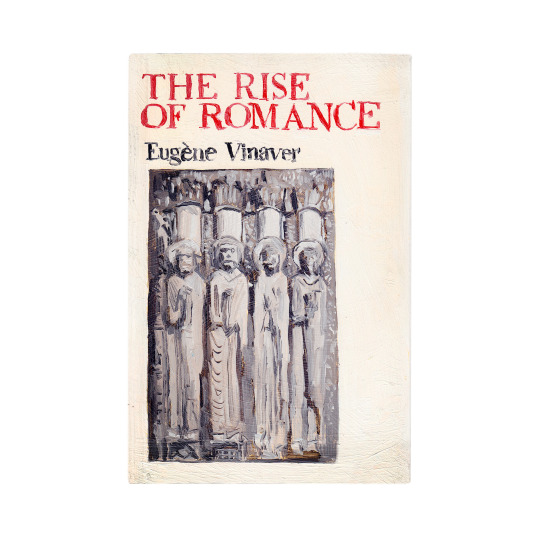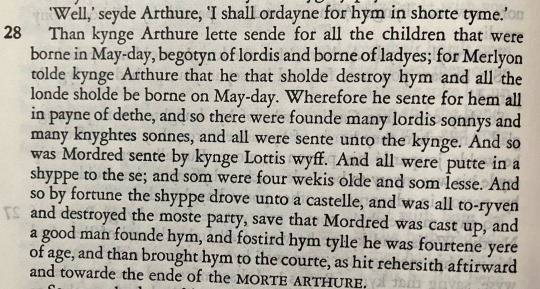#eugene vinaver
Text
Today we found my husband's old copy of Gawain and the Green Knight from his university days. It has terrible, terrible 1980's cover art, coffee stains, and little notes in the margins that say things like Guinevere toughs it out or Arthur is painted as a foolish cuckold in my husband's handwriting but the handwriting is younger, it's familiar but not fully developed the way I know it. He's written his name inside the cover in faux medieval script. I didn't know it was possible to crush on the person your spouse was before you ever met them.
#arthuriana#husband#gawain and the green knight#eugene vinaver#medieval literature#i adore this man#mush
232 notes
·
View notes
Note
Hi! I am an Arthurian prof and I saw your post about Malory Daily. I have a few suggestions on editions!
Most scholarship these days focuses on the Winchester Manuscript version of the Morte, whereas most popular modern English editions use the Caxton version as their source. Any public domain versions of the Morte will use Caxton. Winchester is considered closer to Malory's original text (but it's not The original), since Caxton (often heavily) edited the text to better serve his mercantile audience. For example, he makes heavy cuts to the Roman War as well as the Pentecostal Oath. If you're looking to include scholarship with each day's post, I recommend taking this into account, as most contemporary scholarship is going to focus primarily on Winchester!
With that in mind, I have a few recommended editions, although these are not in the public domain:
For Middle English (ME), PJC Field's edition through DS Brewer is the only (as in best) option. There's a paperback edition that costs ~$25 that is a BRICK but it is the best bang for your buck while also just straight up being the best version. There's also a hardcover set of the Morte and accompanying notes that is like $350 and is considered the scholarly standard, but the paperback edition is the exact same thing minus the notes. If you haven't read ME before, Malory is a great place to start because it is VERY LATE ME. He was writing in the century after Chaucer, and it's much easier to read than good ol Geoff. This is the version that most scholarship will be citing; the journal Arthuriana requires all Malory quotes to be from this version. Field in general is a great expert on all things Malory as well.
For modern English, I recommend the translation by Armstrong from Parlour Press. I believe it's also ~$25. Dorsey Armstrong is currently the editor of Arthuriana and she quite literally wrote the book on gender in the Morte. Her translation is really accessible and sticks extremely close to the ME. In my opinion, this is going to give you the closest experience to reading the ME without having to read the ME.
Future editions: at some point a translation from Whetter and Tolhurst is going to come out. K.S. Whetter is one of the big names working directly with the Winchester Manuscript (literally wrote the book on it too, studied under Field, etc) so this is bound to be a great version for anyone who wants an experience closest to the manuscript.
I hope this is helpful!
Thank you so much for this, it's been extremely helpful! I was going to make a short post about different editions but this has been 100% more coherent than anything I was going to write, and I will include all your notes in the blog's about page!
Unfortunately because I'm not too sure about copyright issues, it's easiest for the Substack to include a public domain version (more specifically the version on Project Gutenberg), with an accompanying post comparing the differences between this version and the Oxford World Classics Helen Cooper (which I'll make available online via a big ol' resources GDrive) and the Complete Works edited by Eugene Vinaver (which I have a physical copy of).
Seconded on the P.J.C Field edition which was my bible when I was writing my dissertation, although I've had a look online and it's close to impossible to access unless you are affiliated with a university in some way. I had no idea a new edition was in the works but that is really exciting!
47 notes
·
View notes
Text
"Malory treats the theme of magic, which runs throughout much of his source material, with similar caution. [Eugene] Vinaver notes that he appears to have ‘deliberately avoided, as far as he could, any excess of the supernatural’. This is seen most obviously in the Morte’s omission of the circumstances of Merlin’s birth as they appear in Geoffrey of Monmouth’s Vita Merlini and Historia Regum Britanniae, and the Suite de Merlin. While the earlier texts relate his fiendish paternity and suggest that his ‘magic never entirely escapes from associations with the demonic’, Malory simply omits Merlin’s origin story. This leaves his supernatural abilities, and the resistance of ‘the damesel [...] that hyght Nenyve’ (125) to him as a ‘devyls son’ (126), largely unexplained, heightening the sense of ambivalence that accompanies the character. [D.L] Hoffman suggests that ‘the untold tale of Merlin’s birth haunts the opening of Malory’s Morte D’Arthur’, enhancing the sense of mystery surrounding Malory’s depic- tion of him. This sets a precedent that will recur throughout the Morte: despite Malory’s attempts to omit elements of the weird inherent in the Arthurian story, they repeatedly creep back into his text."
– Anna Caughey, 'Virginity, Sexuality, Repression, and Return in The Tale of the Sankgreal' in Arthurian Literature 28
9 notes
·
View notes
Photo

Untitled Project: Robert Smithson Library & Book Club
[Vinaver, Eugène, The Rise of Romance, 1971]
Oil paint on carved wood, 2017
#LITERARY AND CULTURAL CRITICISM#LITERARY CRITICISM#CRITICISM#ART HISTORY#ART#EUGENE VINAVER#THE RISE OF ROMANCE#ROMANCE#VINAVER#EUGENE#HARDCOVER#1971#AVAILABLE
1 note
·
View note
Text
Here's another scriptural parallel for you.

King (Arthur, Herod) is warned by sage(s) (Merlin, magi) of a child with the potential to wreck said king's career (Mordred, Jesus) and decides to commit mass murder about it. Despite his bloody precautions, he fails to kill the child, who is raised in safety elsewhere until it's old enough to return.
As in my earlier example, the scriptural king's actions are defined in the text as morally wrong, while the Arthurian king's receive no commentary.
35 notes
·
View notes
Text
Le Morte d'Arthur: conclusions
-This has absolutely entered my personal top ten literary works of all time. Not exactly what I was expecting when I started out. I don't think I've cried so much over a book since Cyrano de Bergerac. I had to return my friend's copy so I went online and ordered a secondhand edition of Malory's collected works because I refuse to live without this in my life.
-In case anyone is wondering, the edition I've been reading and posting from is Eugene Vinaver's, printed by Oxford University Press, 1955. Highly recommended.
-I've already started in on the collected works (also Vinaver's) and will probably keep posting intermittently about it whenever my hands aren't full of small children.
-Other projects include translating Geoffrey of Monmouth and dabbling in Welsh until I can read the Mabinogi myself because my brain says so. It'll be slow going because of aforementioned small children but oh my gosh it's fun. I don't know if I'll ever be in a practical position to go back to school for medieval studies but one can dream, right? And meanwhile tumblr keeps doing its lovely thing of giving me a space for musings and discourse and weird jokes in parallel with other people who are interested in the same obscure stuff, which was the best part of university anyway.
-Thanks to everyone who's been following along for being patient with my rants and helping my motivation. I treasure every like on my little twelve-note commentaries. Y'all rock.
#arthuriana#medieval literature#thomas malory#le morte d'arthur#eugene vinaver#is it melodramatic to rate a book as lifechanging
11 notes
·
View notes